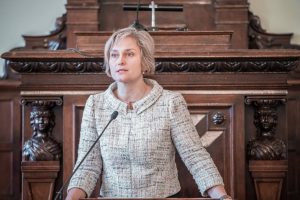I. Ziemele: We should be aware that a court of any Member State is simultaneously also a court of the European Union
On Friday, 18 October, President of the Constitutional Court Ineta Ziemele, together with President Egils Levits and President of the Court of Justice of the European Union Koen Lenaerts participated in the plenary session of the 7th International Scientific Conference of the Faculty of Law of the University of Latvia “Legal Science: Functions, Significance and Future in Legal Systems”, which was moderated by Dean of the Faculty of Law Anita Rodiņa.

From the left: President of the Court of Justice of the European Union Koen Lenaerts, President of the Constitutional Court Ineta Ziemele, President Egils Levits and Dean of the Faculty of Law Anita Rodiņa. Photo: Toms Grīnbergs, University of Latvia.
The plenary session was opened by President Egils Levits. In his presentation, the President spoke about the national and supranational dialogue of constitutional bodies, in this context, highlighting the need to establish the State Council also in Latvia. The next speaker was Koen Lenaerts, the President of the Court of Justice of the European Union (hereinafter – CJEU), who pointed to the contribution made by the State of Latvia and the Latvian lawyers to the development and improvement of the legal system of the European Union, inter alia, expressed gratitude to President Egils Levits for his contribution while serving as a Judge of CJEU.
Ineta Ziemele gave a presentation on the development of the principle of the rule of law and understanding of a modern court in the European framework. She analysed the impact left by the process of European integration, consolidation of the European Union law and the principles upon which the legal system of the European Union (hereinafter – the EU) was based on, and the understanding of the principle of the rule of law and modern court. She underscored that the modern rule of law was defined by the scope in which the party implementing the rule of law – a judge – was able to exercise the mandate granted to him or her in the scope to ensure the highest possible level of rule of law.

President of the Constitutional Court of the Republic of Latvia. Photo: Toms Grīnbergs, University of Latvia.
Turning to the importance of courts, Ineta Ziemele stated that it followed from the structure of the EU legal system that a court of any member state was simultaneously also a court of the EU. Moreover, a modern court contributes to developing trust in modern democratic structures within one state and, through law, increases also trust in the EU. She emphasised that the quality of a Latvian court was also the quality of an EU court, through which we are responsible not only before the law but also the State – before the EU. Thus, today, the scope of the principle iura novit curia (a judge knows the law) covers also detailed application of the national, EU and international law, finding the right balance to ensure to each EU citizen the possibilities to develop within a democratic, rule-of-law framework.
Ineta Ziemele concluded her presentation with the idea that each person residing in Latvia was important for reinforcing the modern rule of law not only in Latvia but also in the common EU legal space. EU Member States should ensure uniform, effective and equal respect for the EU law throughout the EU.
Ineta Ziemele’s presentation “Modern Justice for European Citizens” is available here.



